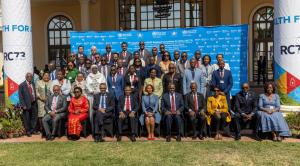African health ministers kick off region’s flagship health meeting
Gaborone – African health ministers and government representatives today opened the Seventy-third session of the World Health Organization (WHO) Regional Committee for Africa to discuss and agree on key measures to address the region’s health challenges, advance and promote good health and well-being.
The annual gathering – WHO Africa’s highest decision-making body – is taking place this year in Gaborone, Botswana, from 28 August to 1 September. The meeting will focus on a range of strategies to bolster health systems, enhance readiness and response to health emergencies, reinforce ways to tackle nutrition and food insecurity crises, as well as address the threat of infectious and chronic diseases among other challenges.
With the acute phase of the COVID-19 pandemic now ended, countries are striving to rebuild from its devastating impact on economies, health and livelihoods, and drawing lessons on how to better prepare for future pandemics and shocks.
“We are faced with a multiplicity of problems, worsening poverty, humanitarian crises, food insecurity … which have a negative impact on our health and well-being. Now more than ever there is a critical need to enhance international collaboration and global solidarity building on the experience from the COVID-19 pandemic,” said H.E Mokgweetsi Masisi, President of Botswana.
Addressing current and emerging challenges requires strong collaborations and partnerships to meet key health and other development objectives.
“The collaboration between WHO and the AU Commission Health Department is a fundamental pillar in the implementation of health programmes, Sustainable Development Goals and the aspiration of the AU’s 2063 agenda,” said H.E Ambassador Minata Samaté Cessouma, African Union Commissioner for Health, Humanitarian Affairs and Social Development.
As countries work to reinforce health system resilience for universal health coverage and health security, disease outbreaks including polio, cholera, Ebola and Marburg Virus Disease, among others continue to pose challenges. These outbreaks are compounded by natural disasters linked to climate change.
“I urge all Member States to take decisive action to provide health, by reorienting your health systems towards primary health as the foundation of universal health coverage,” said Dr Tedros Adhanom Ghebreyesus, WHO Director-General. “I urge all Member States to take action to protect health, by strengthening your defences against health emergencies.
This year’s Regional Committee coincides with the WHO’s 75th anniversary during which year-long activities are being held to celebrate success in health and accelerate efforts to address current and future challenges.
The African region has made significant progress in many areas. Improvements in public health emergency response have resulted in quicker detection of outbreaks, new HIV infections in the region and AIDS-related deaths have fallen over the past decade, and the fight against neglected tropical diseases has made major progress, with leprosy all but eliminated as a public health problem.
“We acknowledge the commitments our leaders have made to accelerate progress towards universal health coverage and health security. And the joint actions by governments and partners to translate these commitments into reality,” said Dr Matshidiso Moeti, WHO Regional Director for Africa. “Although we’re living in a challenging global context of health, recent advancements in our Member States demonstrate that the future of health in the African region is hopeful.”
Dr John Kaseya, the Director-General of the Africa Centre for Disease Control and Prevention called for increased pandemic preparedness by countries with support from partners to ensure an effective response to safeguard health and livelihoods.
“The next pandemic is coming, and we need to be prepared like other continents are preparing” said Dr Kaseya.
Around 800 participants, including representatives from United Nations agencies, nongovernmental organizations, civil society, academia and development partners, are attending the five-day meeting in Gaborone, either in-person or virtually.
The Regional Committee is the WHO’s decision-making body in the region, convening annually to discuss and endorse regional policies, activities and financial plans to improve the health and well-being of people on the African continent.
Please click this link for more information on the Seventy-third session of the WHO Regional Committee for Africa.



